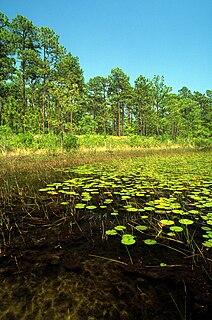This page is based on this
Wikipedia article Text is available under the
CC BY-SA 4.0 license; additional terms may apply.
Images, videos and audio are available under their respective licenses.

Roanoke Island is an island in Dare County on the Outer Banks of North Carolina, United States. It was named after the historical Roanoke Carolina Algonquian people who inhabited the area in the 16th century at the time of English exploration.

The Roanoke Colony, also known as the Lost Colony, was the first attempt at founding a permanent English settlement in North America. It was established in 1585 on Roanoke Island in what is today's Dare County, North Carolina. The colony was sponsored by Sir Walter Raleigh, although he himself never set foot in it.

The Lumbee Tribe of North Carolina is a state-recognized tribe of obscure tribal origins numbering approximately 60,000 enrolled members, most of them living in Robeson and the adjacent counties in south-central North Carolina. The Lumbee Tribe was recognized as a Native American tribe by the United States Congress in 1956 under conditions that it agreed to at the time, which did not allow them to have benefits available to other federally recognized tribes. According to the 2000 United States Census report, 89% of the population of the town of Pembroke, North Carolina, identify as Lumbee; 40% of Robeson County's population identify as Lumbee.

Pisgah National Forest is a National Forest in the Appalachian Mountains of western North Carolina. It is administered by the United States Forest Service, part of the United States Department of Agriculture. The Pisgah National Forest is completely contained within the state of North Carolina. The forest is managed together with the other three North Carolina National Forests from common headquarters in Asheville, North Carolina. There are local ranger district offices located in Pisgah Forest, Mars Hill, and Nebo.

Croatan Beach is a residential neighborhood in the independent city of Virginia Beach, Virginia, United States. It is located on the Atlantic Ocean south of Rudee Inlet and north of Camp Pendleton near the Virginia Beach oceanfront. It is situated in a prime location once planned as a religious and educational resort that was to be called Chautauqua-By-The-Sea.

North Carolina Highway 101 (NC 101) is a primary state highway in the U.S. state of North Carolina that serves as a shortcut for U.S. Route 70 (US 70). It links Havelock to Beaufort, bypassing Morehead City. Most of the area along NC 101 is rural with many farms and swamps.

Uwharrie National Forest is a federally designated national forest region located primarily in Montgomery County, but also extending into Randolph and Davidson counties in south central North Carolina. It is the smallest of the four National Forests in North Carolina, with a total area of 50,645 acres (204.95 km2). About 79% of its acreage is in Montgomery County. The forest is managed together with the other three North Carolina National Forests from common headquarters in Asheville, North Carolina. However, it does have a local ranger district office in Troy, North Carolina. There is one officially designated wilderness area within the forest—the 5,025-acre (20.34 km²) Birkhead Mountains Wilderness.

The Virginia Dare Memorial Bridge is a four-lane automobile bridge spanning the Croatan Sound, between Manns Harbor and Roanoke Island, in Dare County, North Carolina. The bridge carries US 64 Bypass and is utilized by local and seasonal tourist traffic.

Broad Creek is an unincorporated area and census-designated place (CDP) in Carteret County, North Carolina, United States. As of the 2010 census it had a population of 2,334. It is part of the greater Newport area and currently shares the Newport zip code of 28570.

Manteo was a Native American Croatan Indian, the chief of a local tribe that befriended the English explorers who landed at Roanoke Island in 1584. In 1585 the English returned to Roanoke, arriving too late in the year to plant crops and harvest food, and Manteo helped the colonists make it through the harsh winter. He traveled to England on two occasions, in 1584 and 1585. After staying there, he was among those who sailed for the New World in 1587 along with Governor John White and his colonists, who founded the failed settlement later known as "The Lost Colony". On Sunday, August 13, 1587, Manteo was christened on Roanoke Island, making him the first Native American to be baptized into the Church of England.
The Roanoke, also spelled Roanoac, were a Carolina Algonquian-speaking people whose territory comprised present-day Dare County, Roanoke Island and part of the mainland at the time of English exploration and colonization. They were one of the numerous Carolina Algonquian tribes, which may have numbered 5,000-10,000 people in total in eastern North Carolina at the time of English encounter.

The Neusiok Trail is a 20.4-mile (32.8 km) hiking trail located in the Croatan National Forest in Carteret County, North Carolina. The trail traverses the forest from a sandy beach on the Neuse River to a salt marsh on the Newport River, and along the way, it crosses cypress swamps, hardwood ridges, longleaf-pine savannah and pocosin—shrubby bogs The entire Neusiok is part of the Mountains-to-Sea Trail (MST) which spans North Carolina, and the MST in the Croatan is a designated National Recreation Trail.
George Edwin Butler was an American lawyer and an author of research studies and works, particularly about North Carolina. His most notable book is The Croatan Indians of Sampson County, North Carolina. Their Origin and Racial Status. A Plea for Separate Schools (1916). His older brother, Marion Butler, was elected as United States Senator from North Carolina.













